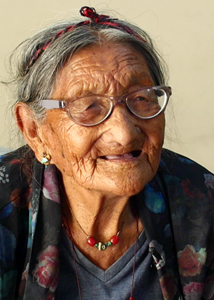Name: Tsephel
(Alias: No)
Gender: Female
Interview Age: 92
Date of Birth: 1925
Birthplace: Khapochi - Sakya, Utsang, Tibet
Year Left Tibet: 1959
Profession: Servant
Monk/Nun: No
Political Prisoner: No

Interview No.: 6U
Date: 2017-04-04
Language: Tibetan
Location: Sakya Tibetan Settlement, Puruwala, Himachal Pradesh, India
Categories: Culture and History
Keywords: business practices/livelihood, Chinese -- first appearance of, customs/traditions, environment/wildlife, escape experiences, poor/lower class, thamzing/struggle sessions, Utsang
Summary:
Tsephel was born in 1925 in Khapochi, Utsang Province in a small village where only a few very poor families lived. She lived with her mother and grandmother in a one-room house built of stones with baskets to cover the doorway. She tells a story about her lamb being snatched away by an eagle and another story about the protective deities near Kyele Monastery.
The people of Khapochi earned a living by going into the mountains to collect wild plants like pena used to make fires and jama used for brooms. They also collected sukpa, which was dried and ground to be used as soap, and chutsa, which was dug out of the ground and used for dyeing cloth. These items were taken to the nearby town of Sakya and bartered for small amounts of tsampa 'flour made from roasted barley' or barley.
When the Chinese arrived in Sakya, they subjected the wealthy people and monks to physical struggle sessions. Tsephel witnessed the Tibetan people assaulting the leaders and monks under the influence of the Chinese. The people of Khapochi heard about the escape of His Holiness the Dalai Lama and chose to leave as well. The journey to India was exhausting and not everyone in the group made it there.
Interview Team:
- Marcella Adamski (Interviewer)
- Tenzin Yangchen (Interpreter)
- Tenzin Choenyi (Videographer)

